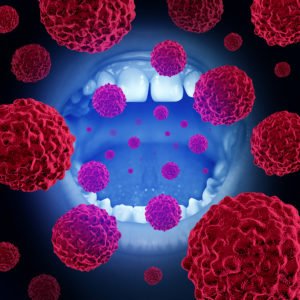Oral Cancer – Causes, Warning Signs, And Treatment
 Oral cancer is a serious medical condition that can have life-altering effects on your health. Cancer is a disease that occurs when cells grow uncontrollably, attacking and causing damage to tissue. Oral cancer can be considered any cancer of the lips, tongue, cheeks, roof or floor of the mouth, palates, throat, and sinuses. Oral cancer appears as a growth or sore in the mouth that does not go away and needs to be treated early, otherwise proving life threatening. Over 40,000 people in the United States are diagnosed annually with oral cancer.
Oral cancer is a serious medical condition that can have life-altering effects on your health. Cancer is a disease that occurs when cells grow uncontrollably, attacking and causing damage to tissue. Oral cancer can be considered any cancer of the lips, tongue, cheeks, roof or floor of the mouth, palates, throat, and sinuses. Oral cancer appears as a growth or sore in the mouth that does not go away and needs to be treated early, otherwise proving life threatening. Over 40,000 people in the United States are diagnosed annually with oral cancer.
Causes Of Oral Cancer
Men are twice as likely to develop oral cancer as women, with men 50 and older at the greatest risk. Sometimes, the development of oral cancer is hereditary – a quarter of all oral cancers occur in people who do not engage in behaviors that is considered risky for the development of the disease, such as the following:
- Tobacco Use – Those who smoke cigarettes, cigars, or pipes are six times more likely to develop oral cancer. Those who use smokeless tobacco, such as dip, snuff, or chew, are 50 times more likely to develop oral cancer. Users of smokeless tobacco are especially susceptible in their cheeks, gums, and lip linings.
- Overindulgence of Alcohol – Those who consume alcohol in excess are six times more likely to develop oral cancers.
- Excessive Sun Exposure – Believe it or not, this can contribute to oral cancers, especially if the exposure comes at a young age. Be sure to put sunscreen on your young children!
- HPV – Certain strains of the human papillomavirus can contribute to the development of oral cancer.
Symptoms Of Oral Cancer
If you develop patches in your mouth that are white, red, or speckled, you should be concerned about oral cancer. The same is true if you notice any swellings, thickenings, lumps, bumps, or rough spots. You should also be on alert if your mouth is bleeding unexplainably, or if you have unexplained numbness or pain in any area of your face or mouth. If you have sores on your face, mouth, or neck that have not disappeared for two weeks and are susceptible to bleeding, you may want to contact your dentist. Other symptoms can include difficulty chewing, swallowing, or speaking, hoarseness or chronic sore throat, ear pain, or dramatic weight loss. If you are experiencing any of the above, it is highly recommended that you contact your dentist as soon as possible.
Treatment Options
If you have oral cancer, it will be treated the same way most other cancers are treated. You will undergo surgery to remove the cancerous growth. You will then undergo radiation therapy or chemotherapy as means to destroy any remaining cancerous cells. The one-year survival rates for oral cancers is 81{3b0f9398becb40f4bdd8fe95c600d2c252c33730296b97da1b334948809cb5c4}. The five-year survival rates are 56{3b0f9398becb40f4bdd8fe95c600d2c252c33730296b97da1b334948809cb5c4}, while the ten-year survival rates are 41$.